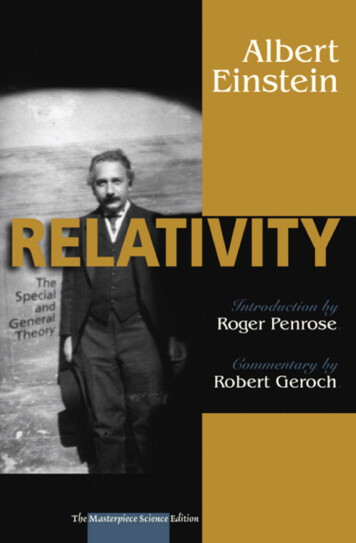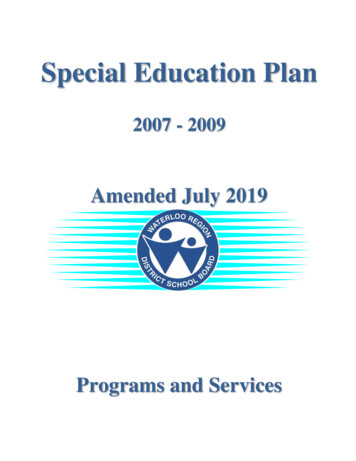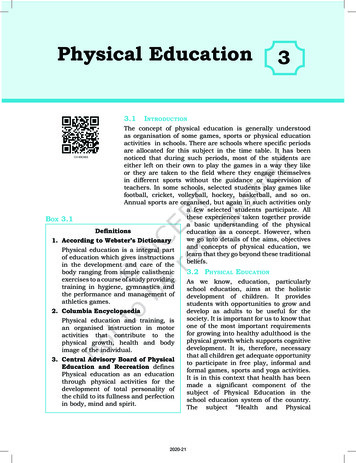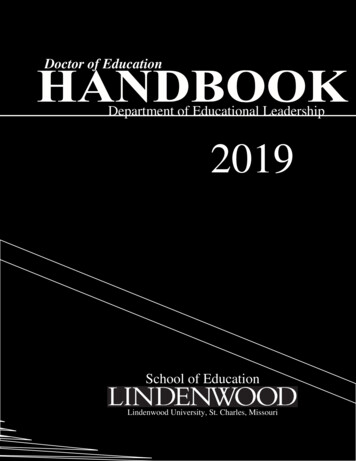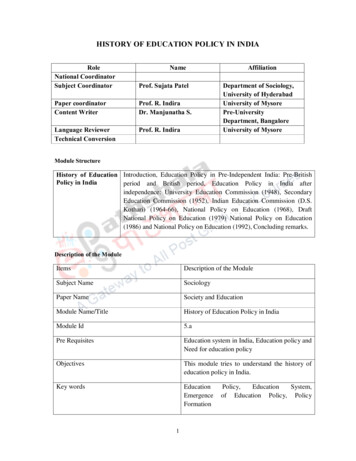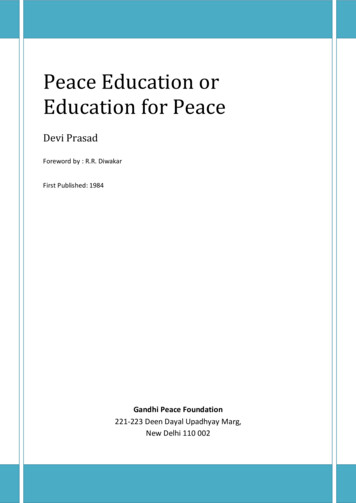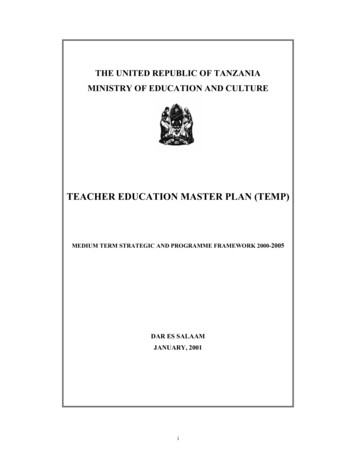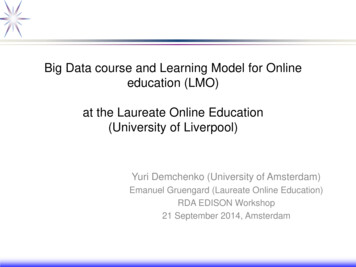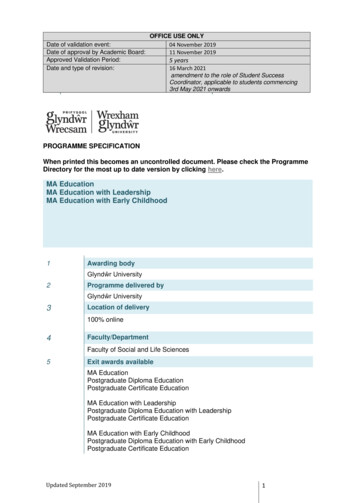
Transcription
OFFICE USE ONLYDate of validation event:04 November 2019Date of approval by Academic Board:11 November 2019Approved Validation Period:5 yearsDate and type of revision:16 March 2021amendment to the role of Student SuccessCoordinator, applicable to students commencing3rd May 2021 onwardsPROGRAMME SPECIFICATIONWhen printed this becomes an uncontrolled document. Please check the ProgrammeDirectory for the most up to date version by clicking here.MA EducationMA Education with LeadershipMA Education with Early Childhood1Awarding bodyGlyndŵr University2Programme delivered byGlyndŵr University3Location of delivery100% online4Faculty/DepartmentFaculty of Social and Life Sciences5Exit awards availableMA EducationPostgraduate Diploma EducationPostgraduate Certificate EducationMA Education with LeadershipPostgraduate Diploma Education with LeadershipPostgraduate Certificate EducationMA Education with Early ChildhoodPostgraduate Diploma Education with Early ChildhoodPostgraduate Certificate EducationUpdated September 20191
6Professional, Statutory or Regulatory Body (PSRB) accreditationNot applicableThe information above is correct at the point of programme validation,refer to university PSRB register and university website for currentdetails of programme accreditation. This information is correct at thetime of validation, please refer to the PSRB register for currentaccreditation status.7Please add details of any conditions that may affect accreditation (e.g.is it dependent on choices made by a student?) eg. completion ofplacement.Not applicable8JACS3 / HECoS codesX2009/ 100459UCAS codeNot applicable10Relevant QAA subject benchmark statement/sThe Masters Characteristics Statement published September 2015.11Mode of studyOnline/distance learning part time12Normal length of study for each mode of studyNote that students are not eligible for funding for a postgraduatequalification if the duration of the part time route is more than double theduration of the full time route.Minimum: 2 years part-timeMaximum: 4 years part-time13Language of studyEnglish14The following University Award Regulations apply to this programmeUpdated September 20192
General Regulations and Definitions Regulations for Bachelor Degrees, Diplomas, Certificates and Foundation Degrees Regulations for Taught Masters Degrees Regulations for Taught Masters Degrees taught entirely by online distance learning Regulations for Integrated Masters Degrees Regulations for Masters of Research Regulations for Professional Graduate Certificate in Education Regulations for Postgraduate Certificate in Education Regulations for Certificate in Education Regulations for Graduate Diploma Graduate Certificate Regulations for BTEC Higher National Qualifications Regulations for Glyndŵr University Certificate of Attendance, Glyndŵr University Certificate ofContinuing Education, Glyndŵr University Professional Certificate Regulations Glyndŵr University English Language Test17 Criteria for admission to the programmeStandard entry criteriaCandidates must satisfy the general admissions requirements of the programme,which are as follows:All candidates will be expected to have a good first honours degree (2:2 or above)or, professional qualifications and/or experience judged equivalent. The candidatewill have met the relevant English Language requirements.English language requirements:Applicants may be required to provide evidence of English Language ability. Moredetails can be found on the University website under the programmes admissionsrequirements or please access our English Language requirementspage: s/EntryandEnglishLanguageRequirements/ Academic courses at Glyndŵr University require a minimumentry requirement of: Academic level IELTS Postgraduate (taught) 6.0.For all module's students require access to a professional and/or experience of acontext that will enable them to undertake work-based/related research and/orpractice.Exceptionally, applicants without a first degree who can evidence extensiverelevant experience of more than two years in a relevant professional role(s) mayUpdated September 20193
be considered. Such applicants may be subject to additional selection criteria atthe University’s discretion.Following the applicants first initial interest they will be contacted by the EnrolmentAdvisor (EA), via both email and telephone. The EA will discuss with the student toidentify that a fully online distance MA is the suitable programme for them andestablishes whether they have a profile which will be likely to succeed in applyingfor the programme. The EA then compiles a complete file on the applicant helpingthem to provide all necessary documentation, such as proof of identification,transcripts, certificates, IELTS certificates, etc. This file is then used to completethe enrolment process for the next available (or the applicants preferred) intake.Where applicants may be borderline, their file will be passed to the person(s)responsible for enrolment decisions within the Education department. The EAsupports the applicant and is available to deal with any queries up until the pointwhen the applicant pays for their first module, at which point they are introduced tothe Student Success Coordinator.A non-graduate may also be admitted to candidature provided that they have held,for a minimum of two years, a responsible position, which is relevant to theprogramme to be pursued.Entry requirements are in accordance with the University’s admissions policyclick hereInternational entry qualifications are outlined on the National AcademicRecognition and Information Centre (NARIC) as equivalent to the relevant UKentry qualification.In addition to the academic entry requirements, all applicants whose first languageis not English or Welsh must demonstrate English language proficiency.European students are able to provide this evidence in a number of ways (pleasesee requirements/ fordetails), including IELTS.International students require a UKVI Approved Secure English Language Test(SELT) (please ts/EntryandEnglishLanguageRequirements/ for details).DBS RequirementsNot ApplicableSuitability for Practice ProcedurePlease see Wrexham Glyndwr University's Fitness to Practice Policy andSuitability to Practice Policy.Non-standard entry criteria and programme specific requirementsUpdated September 20194
Prospective students are expected to be professionals and already in relevantemployment (full-time / part-time / voluntary), however, we would not discriminateagainst those who are not employed or have retired, provided they can meetpractitioner-based requirements.For Master’s level learning delivered through an online environment, there is arequirement for students to have an appropriate level of digital competenceincluding computing proficiency that enables them to access the onlineenvironment. The level of competence would be evident through the applicationprocess.18 Recognition of Prior (Experiential) LearningApplicants may enter the programme at various levels with Recognition of PriorLearning (RPL) or Recognition of Prior Experiential learning (RPEL) in accordancewith the University General Regulations. Any programme specific restrictions areoutlined below:Programme specific restrictionsApplicants may RPL a maximum of 60 credits at level 7 onto the onlineprogrammes. RPL is not permitted in relation to the Research Proposal, ResearchMethodology or Research Project.19 Aims of the programmeThe aim of the MA Education online programme is to develop the students’professional practice. The programme is underpinned by contemporary educationtheory and introduces key tools, techniques and models to enable the student toestablish a sound understanding of the theory and practice of the wider context ofeducation across age groups.The students’ application of theory and understanding of education will bedeveloped through online sessions aimed at developing the students’ knowledgeand confidence as practitioners. Students will develop a more critical awareness andunderstanding of the concepts and theoretical frameworks that underpin educationprovision and its impact on development, well-being, relationships and inclusion.The programme offers the student an opportunity to utilise the processes andoutcomes of an academic research study as a mechanism for professionaldevelopment through enhanced research practices via a research project. Studentswill select and apply appropriate techniques and analysis to answer a researchproblem as a means of improving insight and context into professional practiceswithin an education-based area of practice.The programme aims;Updated September 20195
To provide a contemporary, critical and professionally relevant programme atpostgraduate level in education policies and practice;To provide a thorough grounding in the research practices and theoreticalapproaches and debates to support postgraduate study in education;To provide the opportunity for students to pursue education-based theoriesand practice in depth and to carry out independent research into aneducation-based issue;To provide a syllabus and content that meets the needs of a diverse studentgroup;To provide a forum for multi-disciplinary learning and collaboration and anopportunity to look at education in an holistic and multi-faceted arena;To provide a contemporary, critical and applied programme of study atpostgraduate level encompassing applied practice in the professionalcontext.20 Distinctive features of the programmeThe Education department has long-term reputation for quality of undergraduate andpostgraduate provision at WGU. The online MA Education programme providesopportunities for career long professional development for those in education andrelated professional roles. It is designed to reflect the diverse needs of practitionersfrom different educational contexts and to support them in their desire to developtheir professional expertise for the benefit of their students/clients and theirorganisation. Additionally, the programme has been designed to accommodate thecontinuing professional development needs of students who already hold Level 7 orLevel 8 qualifications and, in line with the University’s criteria for Accreditation ofPrior Learning, students may be entitled to exemption for some of the programme’scontent.The online MA Education suite of programmes have been designed to reflect thechallenge faced to design learning specialisms that meet individual and professionalneeds within a more innovative and responsive continuing professional developmentframework. It has been designed as a framework within which individual specialismsenable students to achieve the programme requirements by studying specificcontent for a number of modules and undertaking work in the core modules specificto their specialism. Additionally, it has been designed to prepare students forprogression on to a taught Professional Doctorate programme or for the demands ofa research-based M.Phil./PhD.This online MA Education suite of programmes address the specific interests anddevelopmental needs of a wider education workforce and has been designed toallow students to specialise in specific aspects of work which is recognised by anaward title with the specialism that they have followed. To achieve the individual titleadded, a student must complete at least 30 credits prescribed for that route andUpdated September 20196
complete their assignment work for the Research Proposal, Research Methodologyand Research Project modules in that area. It is expected that students will completewithin two years with a maximum registration period of four years.An opportunity to engage in a significant piece of work-based research ofpublishable quality leads to transformational learning and improvements in students’own skills and career prospects. The programme provides a study forum forprofessionals in similar roles but different settings, where they can safely expresstheir academic skills in terms of theory and their own work-based practice.The online MA Education programmes are to be delivered fully online and have amodular delivery pattern, which includes modules at 15 credits each. The deliverypattern is a carousel model encompassing a framework of eight 15 credit modulesdepending on the programme, before moving on to the dissertation stage thatincludes a research proposal, research methodology and research project. Theonline learning programmes offer high levels of support and flexibility through amodular delivery pattern enabling students to work at a pace that suits theirindividual preferences.MA EducationThe MA Education route has been designed to provide content and context thatrelates directly to the work of educational professionals in a wide range of settings,including schools, colleges, universities and public sector organisations.Course content and assignments are all work-related, enabling you to consider thelatest theoretical underpinning related to your work. The MA Education route willchallenge and extend thinking, deepen understanding and knowledge of the contentand theoretical foundations of the area and encourage critical reflection of practice.MA Education with LeadershipThe MA Education with Leadership route provides an opportunity for professionalsto explore the impact and influences of educational leadership. They will develop acritical and systematic understanding of how policy developments, values,organisational change, partnerships and collaboration can impact the experiences ofstaff, students and stakeholders within the organisation. Through engagement withcurrent texts and policy documents (aligned to the country of study), students willgain a rigorous and thorough understanding of contemporary issues and theories.Knowledge and understanding of key themes and issues in educational leadershipand management will include theories, values, leading change and strategy,partnerships and collaboration.MA Education with Early ChildhoodThe MA Education with Early Childhood route will provide professionals, who arecurrently working within the early childhood sector, with a critical understanding ofhow research, theory, policy and practice intersect within the context of earlychildhood education in general, and within professional and cultural contexts. Theprogramme will promote critical reflection and evaluation of learning in earlyUpdated September 20197
childhood education in relation to global contexts and within the local contexts ofstudents’ needs and interests. The programme will enhance students’ ability toconduct rigorous practice-based research or policy analysis, and to disseminatetheir work as appropriate.21 Credit accumulation and exit awardsExit AwardsThe PG Certificate in Education is an exit award available for a student who hascompleted 60 credits at level 7 and who is unable or chooses not to continue on theprogramme.Students who RPL’d in 60 credits and then did not complete any further credits andwho chose or were unable to continue on the programme, would not be eligible for aPost-graduate Certificate exit award.The PG Diploma in Education is an exit award available for students who havecompleted 120 credits at level 7, and who are unable or choose not to continue onthe programme.Updated September 20198
22 Programme structure diagramThe MA Education: 6 core modules plus the two subject specific modules.The MA Education with Leadership: 6 core modules plus two subject specificmodules.The MA Education with Early Childhood: 6 core modules plus the two subjectspecific modules.The eight-module framework for each online MA Education route is then followed bya final 60 credits, comprised of two 15 and one 30 credit research and dissertationmodules. Any one module will therefore have students enrolled from a number ofdifferent cohorts.LEVEL 7Mod CodeONLED08Mod titleMod CodeONLED11Mod titleMod CodeONLED13Mod titleMod CodeONLED14Mod titleMod CodeONLED12Mod titleMod CodeONLED09Mod titleMod CodeONLED03Mod titleMod CodeMod CodeMod CodeMod CodeONLED10ONLED02ONLED01ONLED15Mod titleMod titleMod titleMod titleCritical and ReflectivePractice in EducationInclusive PracticeMentoring and Coachingin EducationTheory and Philosophy inEducationLearning Technology inEducationCritical Pedagogy andAnti-oppressive PracticePlanning, Assessmentand ueCreditvalueCreditvalueCreditvalueCritical Thinking,Reasoning and ArgumentSkillsCreditvalueLeading and ManagingProfessionalsCreditvalueLeadership andManagement in EducationWell-being and Resiliencein Early ChildhoodCreditvalueCreditvalue15CoreYear 115CoreYear 115CoreYear 115CoreYear 115CoreYear 115CoreYear 115CoreYear 215For MAEducationrouteCoreYear 215For MAEducationrouteCoreYear 215For MAEducationwithLeadershipCoreYear 215For MAEducationwithLeadershipCoreYear 2For MAEducationwith EarlyChildhoodrouteUpdated September 20199
LEVEL 7Mod CodeONLED07Mod titleContemporary Issues inEarly ChildhoodMod CodeONLED06Mod titleResearch ProposalMod CodeONLED04Mod titleResearch MethodologyMod CodeONLED05Mod titleResearch e15CoreYear 215For MAEducationwith EarlyChildhoodrouteCoreYear 215CoreYear 230CoreYear 2Carousel ImagesUpdated September 201910
Updated September 201911
22 Intended learning outcomes of the programmeOn completion of the following learning outcomes students will be able to:Knowledge and UnderstandingA1A2A3A4A5Knowledge and understandingLevel 7 Postgraduate CertificateCritically analyse and evaluate how andunderstanding of philosophy can promoteyour own professional learning anddevelopment in a complex and constantlychanging context of education, teachingand learning;Critically analyse key theoretical conceptsand perspectives in developing inclusiveapproaches and practices;Critically examine and report the socialand/or learning barriers faced by anindividual or specific group of people withinan education setting;Plan, implement and evaluate an inclusiveintervention strategy to tackle barriers tolearning and/ or social participation for anindividual or group of people at risk ofdiscrimination, marginalisation orunderachievement;Analyse critically and reflect on theapplication of theoretical models relating tomentoring/coaching and observation topractical context;Updated September 2019Level 7 Postgraduate DiplomaLevel 7 MA Education Have a comprehensive understanding of howleadership and management are defined in arange of educational contexts with regards toleading and managing people. Apply a comprehensive understanding ofmethodologies to analyse and criticallyevaluate selected leadership approaches in achosen context or educational setting. Ensurethat all aspects of change are evaluated with a 12
specific focus on unexpected or unplannedoutcomes.A6Critically examine the characteristicsassociated with the role of coach/mentor.Critically analyse the attributes and skills ofeffective practice;Evaluate critically the use of peermentoring/coaching as a method for raisingstandards that that will enhance the qualityof within an educational organisation.Critically analyse and evaluate a range oftheories related to the aims and nature ofeducation;A7A8A9 Critically analyse the meaning of ‘learningtechnology’ Show a critical awareness of the role oftechnology in relation to accessibility ineducation. Critically examine the nature of power andinequality in education and society. Critically analyse the role of formal, informaleducation and critical pedagogy in challengingoppression. A10 Present a coherent and argued approach toresearch methodologies based upon a smallscale research project based uponobservations and reflections of their ownprofessional practice.Present a comprehensive and criticallyargued ethics approval form thatdemonstrates an extensive awareness ofethical issues. Critically evaluate the need tobe an informed researcher as well asadhering to ethical standards required by theirwork-based and academic practice.Intellectual skillsB1Level 7 Postgraduate CertificateCritically reflect on educational practice throughan online reflective journal / blog;Updated September 2019Level 7 Postgraduate Diploma Level 7 MA Education 13
B2B3B4B5B6Level 7 Postgraduate CertificateCritically evaluate their own professional identityin their educational practice;Critically analyse their own professionaldevelopment;Critically and systematically reflect upon therelationships between education and societyusing a range of philosophical perspectives thatinfluence you own philosophical stance;Systematically apply concepts of philosophyand education theory to your work-basedpractice in relation to current key debates ineducation and critically evaluate the impact ofresearch and enquiry upon that practice;Critically analyse and evaluate how andunderstanding of philosophy can promote yourown professional learning and development in acomplex and constantly changing context ofeducation, teaching and learning.Level 7 Postgraduate Diploma Level 7 MA Education Evaluate critically the theory and practice of: (i)education for citizenship; (ii) developingphilosophical thinking in education; (iii) spiritual,moral, social and cultural education.Evaluate critically the concept of ‘indoctrination’and the nature of indoctrination in educationalsettings. Critique research, policy and legislation todevelop a complex understanding of howlearning technology is represented in curriculumand pedagogy. Critically evaluate current research andscholarship in relation to critical pedagogy,relevant social policy and education practice. B7 Evaluate critically the nature of critical thinking,reasoning and argument skills arguments forimplementing such skills in educational settings. B8Updated September 2019 14Demonstrate through critical reflection, a deepunderstanding of the philosophical assumptionsthat underpin educational research and howthese can be impacted by the researcher’s ownprofessional value; Critically analyse and evaluate researchmethodologies and methods in an educationcontext to answer a research question orenquiry;
Subject SkillsC1C2C3C4C5C6C7C8Subject skillsLevel 7 Postgraduate CertificateCritically and systematically reflect on andevaluate an area of practice underpinned byappropriate reading and research;Critically evaluate their own professional identityin their education practice;Critically analyse key theoretical concepts andperspectives in developing inclusiveapproaches and practices;Critically examine and report the social and/orlearning barriers faced by an individual orspecific group of people within an educationsetting;Evaluate critically the use of peermentoring/coaching as a method for raisingstandards that that will enhance the quality ofwithin an educational organisation;Critically and systematically reflect upon therelationships between education and societyusing a range of philosophical perspectives thatinfluence your own philosophical stance;Critically analyse and evaluate how andunderstanding of philosophy can promote yourown professional learning and development in acomplex and constantly changing context ofeducation, teaching and learning. Updated September 2019Level 7 Postgraduate DiplomaLevel 7 MA Education Critically evaluate current research andscholarship in relation to critical pedagogy,relevant social policy and education practice. Evaluate critically the impacts of differentapproaches to leadership and management inrelation to policy changes in an organisation; Evaluate critically the impacts of differentapproaches to leadership and management inrelation to policy changes in an organisation; Demonstrate a critical awareness of theoriesand models of well-being and resilience. 15
Subject skillsLevel 7 Postgraduate CertificateC9C10 Level 7 Postgraduate DiplomaCritically evaluate the implications to personaland professional learning and the potentialimpact of the investigation’s outcomes on theorganisation. Level 7 MA EducationDemonstrate a critical approach to researchmethodologies and methods in the SocialSciences;Identify, select and critically evaluate the datathat has been collected from primary andsecondary sources; Practical, professional and employability skillsPractical, professional and employability skillsLevel 7 Postgraduate CertificateD1 Critically analyse their own continualprofessional development;D2 Plan, implement and evaluate an inclusiveintervention strategy to tackle barriers tolearning and/ or social participation for anindividual or group of people at risk ofdiscrimination, marginalisation orunderachievement;D3 Critically analyse the attributes and skills ofeffective practice;D4Evaluate critically the use of peermentoring/coaching as a method for raisingstandards that that will enhance the quality ofwithin an educational organisation;Updated September 2019Level 7 Postgraduate DiplomaLevel 7 MA Education Apply a comprehensive understanding ofmethodologies to analyse and critically evaluateselected leadership approaches in a chosencontext or educational setting. Ensure that allaspects of change are evaluated with a specificfocus on unexpected or unplanned outcomes. Critically reflect upon theories, assumptions,concepts and data to achieve solutions to workbased problems. 16
D5D6Critically and systematically reflect upon therelationships between education and societyusing a range of philosophical perspectives thatinfluence your own philosophical stance;Systematically apply concepts of philosophyand education theory to your work-basedpractice in relation to current key debates ineducation and critically evaluate the impact ofresearch and enquiry upon that practice;D7 Show a critical awareness of the role oftechnology in relation to accessibility ineducation. Critically challenge practice to ensure that it isdemocratic and inclusive. Demonstrate a critical awareness of theresponsibility of those in various professionalroles for providing education, and how this maybe reflected in their own use of education as apolicy driver for social change.Critically explore and evaluate the ethicalapproaches required by practitioners engagingin qualitative research in education;D8 Updated September 2019Critically analyse and evaluate the strengthsand limitations of the research carried out byboth themselves and others. This will contributeto the outcomes of an extended piece of writing,with a clear structure, that demonstratesappropriate Masters level stylistic competenceand the use of accurate sources, citations andreferencing. 17
23 Curriculum matrixTo demonstrate how the overall programme outcomes are achieved and where skills are developed and assessed within individual modules.MA EducationCore oroption?CoreA1A2A3A4A5A6A7A8A9B1B2B3B4B5B6B7B8 CoreCore Theory and Philosophy inEducationCore Learning Technology inEducationCore Critical Pedagogy and AntiOppressive PracticeCore Planning, Assessment andFeedbackCritical Thinking, Reasoningand Argument SkillsCore Core Research ProposalResearch MethodologyCoreCore Research ProjectCore Module TitleLevel 7Critical and Reflective Practicein EducationInclusive PracticeMentoring and Coaching inEducationLevel 7Module TitleCritical and Reflective Practicein EducationInclusive PracticeMentoring and Coaching inEducationTheory and Philosophy inEducationCore oroption?CoreC1C2C3C4C5C6C7C8C9C10D1D2D3D4D5D6D7D8 CoreCore Core Updated September 201918
Module TitleCore ning Technology inEducationCritical Pedagogy and AntiOppressive PracticePlanning, Assessment andFeedbackCritical Thinking, Reasoningand Argument SkillsResearch ProposalCore Core Core Core Core Research MethodologyCore Core Research ProjectMA Education with LeadershipCore oroption?CoreA1A2A3A4A5A6A7A8A9B1B2B3B4B5B6B7B8 CoreCore Theory and Philosophy inEducationCore Learning Technology inEducationCore Critical Pedagogy and AntiOppressive PracticeCore Leading and ManagingProfessionalsLeadership and Managementin EducationCore Core Research ProposalResearch MethodologyCoreCore Module TitleLevel 7Critical and Reflective Practicein EducationInclusive PracticeMentoring and Coaching inEducationUpdated September 201919
Module TitleResearch ProjectA1A2A3A4A5A6A7A8A9B1B2B3B4B5B6B7B8 Core oroption?CoreC1C2C3C4C5C6C7C8C9C10D1D2D3D4D5D6D7D8 CoreCore Theory and Philosophy inEducationLearning Technology inEducationCritical Pedagogy and AntiOppressive PracticeCore Core Core Leading and ManagingProfessionalsLeadership and Managementin EducationCore Core Research ProposalCore Research MethodologyCore Research ProjectCore Module TitleCritical and Reflective Practicein EducationInclusive PracticeMentoring and Coaching inEducationLevel 7Core oroption?CoreMA Education with Early ChildhoodCore oroption?CoreA1A2A3A4A5A6A7A8A9B1B2B3B4B5B6B7B8 CoreCore Theory and Philosophy inEducationCore Learning TechnologyinEducationCore Level 7Module TitleC
The Education department has long-term reputation for quality of undergraduate and postgraduate provision at WGU. The online MA Education programme provides opportunities for career long professional development for those in education and related professional roles. It is designed to reflect the diverse needs of practitioners
